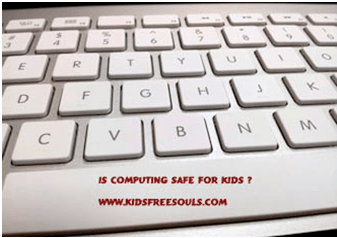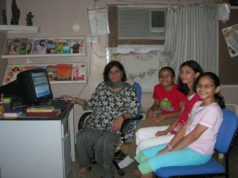Kids computing is like “electronically sugar-coated ‘learning’ that may spoil children’s appetite for the main course.” Encouraging children to “learn” by flitting about in a colorful multimedia world is a recipe for a disorganized and undisciplined mind. Kids should be encouraged to blossom and flower in a free atmosphere.
Their development should be in their own capacities.
Barry Sanders, Professor at Pitzer college, US says “good readers grow out of good recites and good speakers.” Then, as a child matures, his success in reading and writing nurtures his “innermost, intimate guide, the self.” So any threat to language and literacy may limit children’s “inner voice” – their capacity to tell themselves stories and talks themselves through academic or other problems. Those who place their faith in technology to solve the problems of education should look more deeply into the needs of children. The renewal of education requires personal attention to students from good teachers and active parents, strongly supported by their communities. It requires commitment to developmentally appropriate education and attention to the full range of children’s real, low-tech needs — physical, emotional, social, and intellectual development.
So, Beware, Be Aware, Brainstorm to activate the mind cells before its too late!!!
Computers are reshaping children’s lives, at home and at school, in profound and unexpected ways. Common sense suggests that we consider the potential harm, as well as the promised benefits, of this change. To put it simply, childhood is our species’ evolutionary edge. Childhood takes time. And many children are simply not being given the time to be children. Computers are acute symptoms of the rush end childhood.
Children need stronger personal bonds with caring adults. Yet powerful technologies are distracting children and adults from each other. They need time for active, physical play; hands-on lessons of all subjects, especially arts and language. Experience the nature. This is essential for healthy child development to flourish in free atmosphere. Yet many schools and parents opt for Computers distracting the child reading and cutting the minimal offerings in developing areas to shift time and money to expensive, unproven technology! Researchers reveal Computers pose serious health hazards to children. The risks include repetitive stress injuries, eyestrain, obesity, social isolation, and, for some, long-term damage to physical, emotional, or intellectual development. Our children thrive to spend even more time staring at screens increase sight problems. The social and educational need of the low-income children is at stake too. Quite obvious, the drive of Computerization emphasize only one of the human capacities – analytical and abstract thinking of child develops late but it aims to jump start prematurely! Computers are the most sophisticated thinking tools ever designed. They were developed with adult bodies, as well as adult mental capacities, in mind. Even for adults, their intensive use is related to job stress and serious injuries. But emphasizing computers for children, whose growing bodies are generally more vulnerable to stress, presents several challenges to healthy development. The current focus on computers can distract schools and families from attending to children’s true needs, and can exacerbate existing problems.
The computer, like the TV, can be a mesmerizing babysitter. But many children, overwhelmed by the volume of data and flashy special effects of the World Wide Web and much software, have trouble focusing on any one task.
Must five-year-olds be trained on computers today to get the high-paying jobs of tomorrow?
For a relatively small number of children with certain disabilities, technology offers benefits. But for the majority, computers pose health hazards and potentially serious developmental problems. Of particular concern is the growing incidence of disabling repetitive stress injuries among college students who began using computers in childhood. The National Science Board reported in 1998 that prolonged exposure to computing environments may create “individuals incapable of dealing with the messiness of reality, the needs of community building, and the demands of personal commitments.”
Physical health
Emphasizing the use of computers in childhood can place children at increased risk for repetitive stress injuries, visual strain, obesity, and other unhealthy consequences of a sedentary lifestyle. Some development experts also warn that increasing the time that children spend on computers, given the hours they already sit in front of televisions and video games, may contribute to developmental delays in children’s ability to coordinate sensory impressions and movement and to make sense of the results. That could in turn lead to language delays and other learning problems. This health hazard demands immediate attention but its only a concern as every person is in a ‘Computer rat race!’
Muscular-skeletal injuries
Long hours at a keyboard, constantly repeating a few fine hand movements, may overtax children’s hands, wrists, arms, and neck. That, in turn, may stress their developing muscles, bones, tendons, and nerves. For the user, the computer is a kind of straitjacket into which the body must adapt itself. The eyes stare at an unvarying focal length, drifting back and forth across the screen. Fingers move rapidly across the keyboard or are poised, waiting to strike. The head sits atop the spine balanced, in the words of one physician, like a bowling ball. Built for motion humans do not respond well sitting nearly immobile for hours at a time. Children who play games on computers for long hours, fight with the ctrl keys, jump with space or run right-left or topsy-turvy through the arrow keys are sure to freeze with vision, pain in hands and more! There may be greater risk. That’s because their bones, tendons, nerves, muscles, joints, and soft tissues are still growing.
Vision problems
Computer is a strain on child’s eyes and developing visual system and actually makes learning to read, a more complication. Eyestrain experienced by computer operators is related to screen glare and to the screen being either too bright or too dim compared to the ambient light. Maintaining a constant focus on the same distance, at the same angle, inhibits blinking even more than does reading from a book, probably because the monitor presents a vertical reading surface and because our eyes are open wider, making it more of an effort to blink Children or adult, all face visual fatigue from long spells on computer screen. Expecting beginning writers to poke a letter key and then passively watch a letter appear on a screen can be hard on their eyes and an extra perceptual challenge, and thus may actually hamper the process of learning to write and read. Their muscular and nervous system are in developing process too. It’s not until about the age of 11 or 12 that their capacity to balance and coordinate the movement and the focusing of both eyes together is fully mature. A pair of glasses may correct the immediate problem. But myopia itself may be a risk factor for other visual problems. It can interfere with children’s sports activities and enjoyment of nature, and even limit their choice of career
Lack of exercise and obesity
Many health professionals believe childhood obesity has increased lately in large part because children spend more time sitting in front of electronic media and less time actively playing, at home and school, and because they consume so many high-fat, high-sugar foods and junk stuff. Be it a television or Video game or Computers, children have found their way into modern technology with a bang. Children are prone to diabetes, a highly risk factor due to obesity and reports say may American children are on rise to diabetes. Lack of exercise is major problem as children are at loss of time divulged into many activities. Classroom learning is soon getting bookish and mugged up lessons.
Isolated lives
Many parents have become active with spending less hours of time together with the child than the earlier years.With the recent surge in the purchase of home computers, laptops, and home connections to the Internet, as well as school connections, children are likely to spend even less time interacting face-to-face with parents, teachers, and friends. Television and Personal Computers are in every kid’s bedroom. The latest fad is gifting of Personal Computer on his birthday! Recent study estimates that children between the ages of 10 and 17 today will experience nearly one-third fewer face-to-face encounters with other people throughout their lifetimes as a result of their increasingly electronic culture, at home, school or classes. Many kids have started living isolated lives and disappear into their rooms to spend most of their time with this wonder technology media. Socially, the kids are cutting themselves out and lack the little courtesies and emotional attachments.
Less self-motivation
Many girls find Computers boring or creative whereas boys plug on to playing more games. Young students often seem to be mesmerized by, and some even addicted to, the action on their screens, rather than motivated to learn. A fascination with technology, Researchers caution, is not the same thing as a motivation to learn about educational subjects beyond the technology itself. Some mesmerizing educational soft wares may be more entertaining that education.
Stunt imagination
Less creativity has crept into the classroom with replacing of computer skills. Creative work draws on a child’s own inner resources – including originality, playfulness in generating ideas, and vigor and perseverance in carrying them out. Similarly, imagination involves the capacity to bring to life pictures of one’s own in one’s own mind. Children who are exposed to a heavy electronic diet of television, the Internet, video games, and multimedia are bombarded with ready-made images, often cleverly animated and quickly swapped with a point and a click, literally leaving nothing to the imagination. Entertained constantly and effortlessly, they are at loss of their imagination and find harder to generate their own images and ideas. Their limitation is up to the visual effects on their minds of the television, video game or computer.
Impaired Language & literacy
The time spent with computers and other electronic media may distract both children and adults from directly communicating with one another, face to face, weaving together the rich variety of spoken and unspoken cues such interactions encourage. That, literacy experts warn, may place children at risk of language delays. In addition, too few chances for such communication, if extended throughout childhood, may permanently limit children’s ability to express them in speech or in writing, to comprehend fully what they read, and even to understand. They are at loss to think logically and analytically. Before their vocabulary is built, kids are spoon feed to computers.
Moral Behavior & Emotional competence
The most important gift that parents can give a child to spur their mental development, is not a good education, elaborate educational toys, or summer camp, but time – regular, substantial chunks of it spent together doing things that are naturally appealing to the child. Dr. Stanley I. Greenspan, the former director of the Clinical Infant Development Program at the National Institute of Mental Health, warn that an emphasis on computers in childhood exacerbates the tendency for our increasingly rushed and impersonal culture to harm the emotional development of children. And that, they add, will take a toll on their intellectual, social, and moral development as well, because emotions guide human learning and behavior. Flooded commercialization ads on television, internet and hoardings call for attention as kids are exposed to not only games, child products but also drugs, pornography etc. Many sites make available targeted banner campaigns and desktop wallpaper downloads that emotionally effect the kids. They are children who are unable to cope with the slightest of frustrations, and lash out aggressively. They are entitled, demanding, impatient, disrespectful of authority, often disapproving of their peers, unempathetic and easily “wounded.” Their numbers are increasing. We must take note of this disturbing trend and intervene with some urgency if we are to raise children who will care about others in society.
To sum up, these are our fundamental beliefs and concerns
* Childhood is a critical phase of life and must be protected to be fully experienced. It should not be hurried
* Each child deserves respect as an individual. Each needs help in developing his or her own unique capacities and in finding ways to weave them into a healthy social fabric.
* Children today are under tremendous stress and suffer increasingly from illnesses such as allergies, asthma, hyperactive disorders, obesity and depression. This stress must be trim down.
Meet the Author of Guardian of Angels and Look Inside the Book








